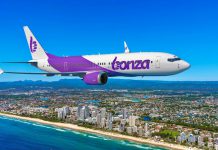The investment outlook for US aerospace giant Boeing has been cut from stable to negative by two ratings agencies as the grounding of the 737 MAX fleet drags on.
Both Fitch Ratings and Moody’s Investors Service maintained their current ratings for the planemaker, which revealed last week that it would take a $US4.9 billion after-tax charge for the MAX problems.
READ: Boeing takes $US4.9 billion after-tax charge for MAX fiasco.
Fitch pointed to the uncertainty around the return to service, the growing logistical challenge of returning parked planes to service and the risk of higher concession to airlines as among the reasons for revising its outlook to negative.
It said the risk of higher airline payments could be a problem if the &37 MAX grounding extends into the end-of-year holiday season.
“The MAX situation also presents significant public relations challenges, and the impact on Boeing’s reputation and brand will be a watch item for the next year or more,’’ it said
“Fitch believes the 737 MAX will remain a concern throughout the aviation credit sector into 2020.
“The 737 MAX situation will reduce much of the financial cushion Boeing has at the current ‘A’ rating, leaving the company more exposed to other unforeseen events or industry developments.
In addition to the 737 MAX, BA has a challenging agenda, including the Embraer S.A. transaction, 777X development, potential New Mid-Market Airplane (NMA) launch, and several planned production rate increases.”
Fitch expects the MAX crisis to cut into operating margins for several years after the MAX returns to service.
Moody’s had similar reasons for its downgrade.
“The change in outlook to negative principally reflects that the grounding of the company’s 737 MAX aircraft will run longer than we had expected, which will compound its operational disruption, costs and the size of the investment in working capital as production remains at a
substantial rate of 42 per month,” said Moody’s senior vice president Jonathan Root.
Moody’s said its negative outlook also contemplated the execution risk in returning the narrow-body franchise to normalcy following the aircraft’s return to service, the date of which remains uncertain.
It also looked at the timeframe for repaying the debt incurred to fund the grounding and restore confidence in the all-important MAX program, and in Boeing, more broadly.
Potential constraints included the rates at which customer and Boeing delivery teams could operate and how long it would take other regulators to give the plane the green light after the US Federal Aviation Administration had done so.
Another was how quickly Boeing can restore production to the pre-grounding monthly rate of 52 and then to its prior mid-2019 goal of 57.
“Financial risk relative to the company’s pre-grounding profile has meaningfully increased, and the resolution and ultimate impact for Boeing, both financially and reputationally, remain unknown,’’ the ratings agency said.
























